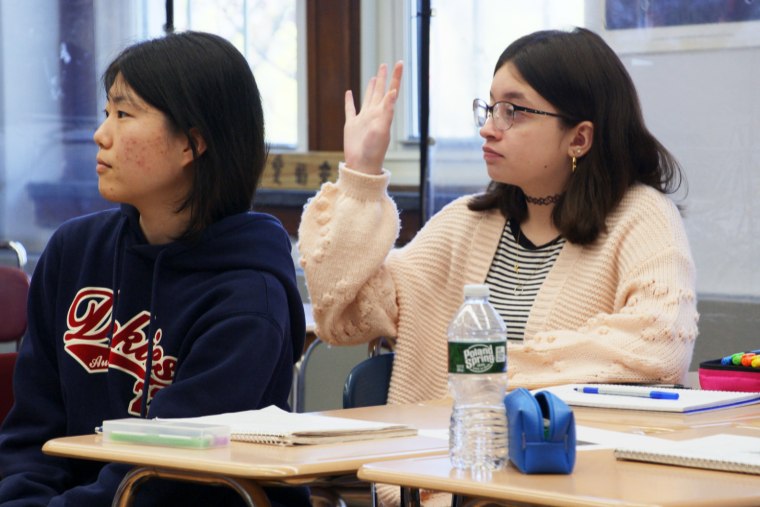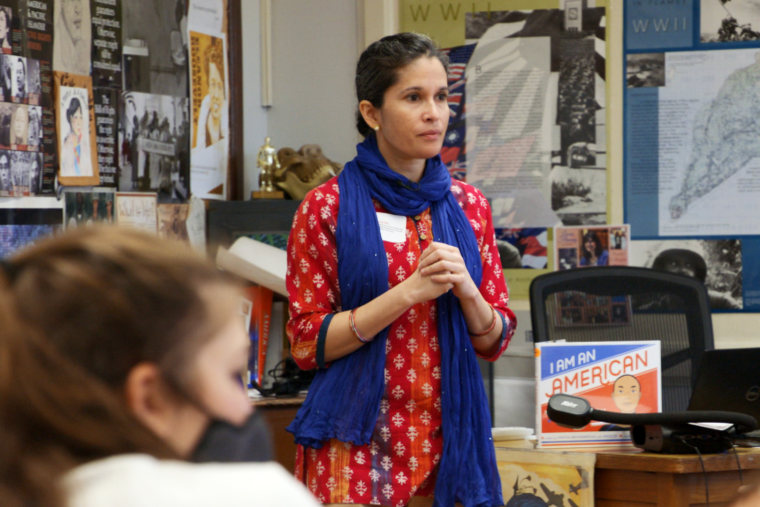Christina Huang, a senior at Ridgewood High School in New Jersey, is proud of her Chinese American heritage. But lately during the pandemic, it hasn’t been easy.
“I actually had someone cough on me, like take off their mask and cough on me, when I was out with my parents. And at the moment, I didn’t really understand,” Huang said. “I was very confused because it seemed very, just the look on his face, very hateful and like spiteful.”
Since the pandemic began, Asian Americans have reported a surge in hate incidents, rooted in a long history of racism.
“I didn’t really understand what it meant until later when we started having conversations about anti-Asian hate and then the coronavirus, that I understand what, why he did that,” Huang said.
The 18-year-old said that while hate and violence was unfolding across the country during the pandemic, she was learning about the history of Asian discrimination in the U.S. through her history teacher, Medha Kirtane, last year.
“There’s a lot of ignorance, I guess, that’s where lack of awareness starts. Well, racism starts with lack of awareness,” Huang said.

Huang knew she wanted to help build a school environment where younger, diverse students felt included. So she reached out to an advocacy group, Make Us Visible New Jersey, to get involved and join efforts to push New Jersey to pass a bill mandating the teaching of Asian American Pacific Islander history in kindergarten through high school in the state's public schools. Huang even testified in front of the state Senate Education Committee last November.
New Jersey and two other states, Connecticut and Illinois, have passed laws to mandate that AAPI history be taught in public schools. Illinois was the first to do so last July, with Connecticut the most recent last month. The laws in New Jersey and Illinois take effect in the upcoming 2022-23 school year, and Connecticut, which requires AAPI studies as part of social studies curriculum, starting in 2025.
At least four other states are working on similar bills. New York City also announced this month that a pilot program for the upcoming school year will put AAPI history into curricula, which will then be fully developed for 2024.
It’s a milestone for AAPI representation, in part because Asian Americans make up the fastest growing group in the U.S., accounting for nearly 6 percent of the U.S. population. Yet AAPIs account for just over 2 percent of teachers.
When Gov. Phil Murphy signed New Jersey's law in January — which requires school districts to “include instruction on the history and contributions of Asian American and Pacific islanders” to K-12 students as part of learning standards in social studies — he also signed a law creating the Commission on Asian American Heritage, a 21-member group that will provide advice and support to schools in developing AAPI history curriculum, and ensuring that teachers are equipped to teach these topics.
According to New Jersey’s law, it will be up to local school districts to select and integrate the content and instructional materials. According to the New Jersey Board of Education, there is no update on the formation of the commission. New Jersey state Sen. Vin Gopal, a Democrat and chair of the Senate Education Committee, told NBC News in a statement, “We need appointments so the commission can help answer questions from school districts. I [am] hopeful the Governor’s office will make appointments as soon as possible.”
Experts say that states working on bills to mandate AAPI history should provide clear requirements, attach revenue for the implementation process, and present a well-developed curriculum.
Stewart Kwoh, co-executive director of the Asian American Education Project, whose organization provides online lesson plans for K-12 educators on AAPI history, said that “there’s a number of steps in the implementation that could go wrong. And so, it’s very important to have the implementation cover 80 percent of the energy that goes into these packages. It’s fine to pass a law, but it’s more important to implement it well.”
These efforts all come at an urgent time, as data from Stop AAPI Hate, from March 2020 to December 2021, shows 1 in 3 Asian American and Pacific Islander parents reported that their child experienced a hate incident at school in the past year.
At Ridgewood H.S., Kirtane, the social studies teacher, understands how crucial it is for students to see themselves reflected in what they are learning. Kirtane, who is Indian American, attended Ridgewood as a student and then returned to teach, after a student suggested she join the teaching staff to increase its diversity. Today, the village of Ridgewood is 15 percent Asian and majority white (76 percent), according to the latest census numbers.

Kirtane said that there's not enough of any history taught in schools and that teachers need to do more to include as many narratives as possible. “History is so important to understanding who we are and why all of us matter,” Kirtane said.
“It fundamentally starts with education. That our teachers, our students, and our teachers and our future teachers need to learn more about the narratives that are absent,” Kirtane said. “I think Asian American history is largely one of those narratives that has been left out.”
Kirtane has been teaching for over 15 years and has incorporated AAPI history every year in her classes, teaching about the 1885 Rock Spring Massacre in Wyoming to famous Supreme Court cases led by Asian Americans such as Wong Kim Ark, Takao Ozawa and Bhagat Singh Thind, that affected citizenship laws. Kirtane also covers famous AAPI labor and civil right activists from Larry Itliong, a Filipino American labor activist, to Yuri Kochiyama.
“Most of these cases are full of complexity as they deal with intersectionality of various identities and challenge the status quo in some uncomfortable and sometimes illicit ways,” Kirtane said. “We need to ask our students to reckon with what is right vs. wrong and does that change based on the nature of the quest for justice.”
Kirtane offers this advice to teachers who may not have a state mandate to support teaching AAPI history in their own classrooms. “There’s so much information out there. You don’t need a state mandate to learn and to share. So be curious and remember, I feel like we all have an obligation to the next generation, to better equip them than the way that we were equipped and to give them critical thinking skills to ask the questions that we should ask ourselves,” Kirtane said.
Katrina Eilender and Jake Cohen are both juniors in Kirtane’s AP U.S. history class this year and are both hungry to learn more.
“If we want to change anything, if we want to understand our own lives, and the lives of those around us, it’s really important to understand the history, and I feel like I’m finally getting there — probably I still have a lot to learn,” Eilender said.
“If you’re learning about American history, you have to learn the history of all Americans, which goes beyond any racial or ethnic-like labels that we can try and put on it,” Cohen said. “Every American person has a story, and if we don’t include all those stories, that’s how you get ignorance, which breeds hatred and racism."
Cohen says before high school, his only experience learning about AAPI history was the Chinese Exclusion Act and Japanese internment camps. By learning more about AAPI history, he said he has a better understanding of some of the issues facing the Asian American community today. “The second Asian Americans started coming to the United States, there was a lot of backlash towards them, just because they were deemed foreigners," he said.
Learning about that history "helped fill in a lot of the gaps, and sort of allow me to understand that the problems that we’re seeing aren’t new, they are part of a larger pattern," Cohen said.
“Eventually you can have something close to the full truth or the full picture of what our country is, where it’s been, where it is now and where it’s going,” Eilender said. “And that’s so enormously helpful to us as citizens, us as young people growing up, us as thinkers and learners.”